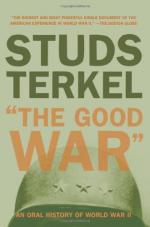
|
| Name: _________________________ | Period: ___________________ |
This test consists of 5 multiple choice questions, 5 short answer questions, and 10 short essay questions.
Multiple Choice Questions
1. Why was Hans Goebler thankful that the Americans took their submarine prisoner?
(a) He was opposed to the war.
(b) He was a believer in democracy.
(c) He was wounded.
(d) Ninety-seven percent of German submarines did not survive.
2. What did Walter Rosenblum do during WWII?
(a) He was a Voice of America reporter.
(b) He was a flautist in the army band.
(c) He was a brigade commander.
(d) He was a combat photographer.
3. What did American soldiers do on the streets of Japan that was considered bad manners?
(a) Chew gum.
(b) Drink alcohol.
(c) Flirt with women.
(d) Smoke.
4. What does Erich Luth say the German nation lacks?
(a) Military courage.
(b) Civil courage.
(c) Personal courage.
(d) Communal courage.
5. Who did Jacques Raboud say were the most likely to survive prison camps?
(a) Those who were strongly religious.
(b) Those who planned to survive.
(c) Those who gave up.
(d) Those who had good health.
Short Answer Questions
1. According to Tommy Corcoran why did the Allies partner with Russia against the Axis?
2. What was Battle Fatigue called during World War I?
3. Why was George Page able to buy beachfront property cheaply during the war?
4. What was a victory girl?
5. Who does Bill Mauldin think was the only nice guy among the WWII generals?
Short Essay Questions
1. According to Lowell Steward, what was the status of the black Tuskegee flying squadron?
2. Why does Jacques Raboud believe it will be difficult for his generation to erase hatred?
3. According to Yasuko Dower, what was different about American customs that she observed when the country was occupied by U.S. troops?
4. According to John Houseman, why was it important for the Office of War Information to broadcast defeats as well as victories?
5. How did Galatea Berger say the Third Reich was recorded in her school history classes?
6. According to Colonel Gleed, how did the study made by the War Department in 1925 affect the black community?
7. According to Tommy Corcoran, what was Joseph Kennedy's strategy for the war?
8. How did Lowell Steward say the war affected the status of blacks in the United States?
9. According to John Kenneth Galbraith, what was ironic about the consumption of consumer goods during the war?
10. What does George Oremont say was required to make money during the war?
|
This section contains 993 words (approx. 4 pages at 300 words per page) |

|




